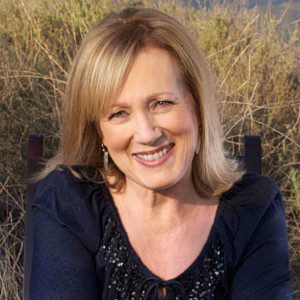 Eighteen months ago, Kay Warren’s 27-year-old son Matthew died by suicide. As co-founder of Saddleback Church, in Lake Forest, California, and wife of the Rev. Rick Warren–one of the nation’s most famous pastors, Matthew’s death was headline news. What the public did not know was that the Warrens had been dealing with their son’s mental illness for more than two decades. When he died, one journey ended and a new journey into activism began for the couple. Saddleback Church added mental illness to a short list of “signature ministry” priorities along with addiction recovery, orphan care, poverty, and HIV/AIDS. Christine A. Scheller talked to Mrs. Warren for The High Calling about the church’s latest effort, “24 Hours of Hope,” a webcast happening today, October 10, in honor of World Mental Health Day. The interview has been edited for length and clarity. After you read the interview, watch the event live at the bottom of this article on October 10.
Eighteen months ago, Kay Warren’s 27-year-old son Matthew died by suicide. As co-founder of Saddleback Church, in Lake Forest, California, and wife of the Rev. Rick Warren–one of the nation’s most famous pastors, Matthew’s death was headline news. What the public did not know was that the Warrens had been dealing with their son’s mental illness for more than two decades. When he died, one journey ended and a new journey into activism began for the couple. Saddleback Church added mental illness to a short list of “signature ministry” priorities along with addiction recovery, orphan care, poverty, and HIV/AIDS. Christine A. Scheller talked to Mrs. Warren for The High Calling about the church’s latest effort, “24 Hours of Hope,” a webcast happening today, October 10, in honor of World Mental Health Day. The interview has been edited for length and clarity. After you read the interview, watch the event live at the bottom of this article on October 10.
Christine A. Scheller: Tell me about “24 Hours of Hope.” How is it different from the Gathering on Mental Illness and the Church that Saddleback Church hosted earlier this year? What do you hope to accomplish?
Kay Warren: “24 Hours of Hope” is our way of bringing attention to World Mental Health Day. Before my son passed away, I was not aware that there was a world mental health day. Because it’s recognized around the world, we tried to think of the best thing that we could do. We decided that we would replay the plenary sessions and several of the workshops that were videotaped at the Gathering on Mental Illness and the Church, which was held at Saddleback March 28, 2014. But it also includes interviews we conducted with the speakers and other folks about mental illness, the church’s role, or their personal stories.
Some of the sessions will be 30-40 minutes long, others will be a minute or five minutes. So it’s a mix of lengthy and bite-sized pieces. We designed it so that it would hit all the major time zones of the world. It actually starts at 11:00 pm PST on the evening of October 9, and then literally jumps into what turns out to be 30 hours of hope, so that it will hit prime time around the globe.
You said before Matthew died you didn’t know there was a World Mental Health Day. I did not write about mental illness before my son Gabriel died either. People often assume there’s some therapeutic benefit for me in writing about his suicide, but that’s not the case for me. I find it difficult, but I’ve felt compelled to write about it. Is that your experience, or is there a therapeutic benefit for you in this kind of activism?
For me, it’s probably a combination of motivations. My prime motivation is if I can stop what happened to our family from happening in somebody else’s family, then I’m going to do what I can. If I can help bring hope to a person who is desperately struggling to stay tethered to life, if something that I say, something that I bring to their attention helps them hang on, then that feels very gratifying to me. If I can bring comfort to a family, and encouragement to a family member to keep hoping for a loved one who is in a desperate place, then it has a way of bringing some beauty from the terrible ashes of his death. If I can help equip a pastor or a church leadership team to more effectively minister to those with mental illnesses, then it’s one more pebble on the side of bringing beauty from the ashes.
So I guess in that sense it’s therapeutic. It doesn’t make the pain any less; it doesn’t make the grief any smaller. It just is a way of saying, this terrible thing that happened to us was catastrophic and if we can prevent that from happening to somebody else, we’re going to do it. If we can bring comfort and healing to those who are still trying to cope with this new normal, then we’re going to do it.
There have been other recent suicides of high profile Christian leaders’ children, but none of those leaders have taken up this kind of activism. Do you have a sense of how powerful your voice on this issue has been this past year? Is this kind of activism just part of your and Pastor Rick’s ministry DNA?
I guess I’m aware of this vast platform that God has given to Rick and me through Saddleback Church, through The Purpose Driven Life, and it feels like it’s part of what Rick calls “the stewardship of affluence and influence.”
We didn’t ask to be on this journey. Nobody ever does. We didn’t ask to have a mentally ill son and he didn’t ask to be mentally ill. We didn’t ask that his life on earth would end the way it did, but all those things happened, and so in light of what has happened to us, it feels like it’s then part of the stewardship of the life experiences that have come our way.
We were humbly aware that sometimes people listen to what we have to say, and if they’re going to listen, we want to make sure that our message is of hope, our message is of trust in God’s goodness, and a commitment to let him take what is so broken and torn apart and shredded in our lives and mend it, put it back together in ways that we can’t on our own.
On a press call for a recent Lifeway Research/Focus on the Family survey about mental illness, you said even families like yours who have sufficient financial resources find it difficult to get help for their loved ones. Can you speak to the difficulty of finding adequate care?
The federal health information privacy (HIPAA) laws have dramatically impacted the way families can offer support to their adult loved ones who are struggling with mental illness. When Matthew was under 18, we had much more control. We could control whether he took his medication, we were in charge of taking him to the doctor, it was up to us to find the resources for him.
When he became an adult, his condition worsened. As it worsened and he needed more medical intervention, we found ourselves in a complete quandary because some doctors would talk to us and some would not. Sometimes he would give permission for a psychiatrist or social workers or hospital personnel to speak with us, and at other times he would refuse to give that permission. When that happened, we were reliant on him to give us correct information, assuming that he had heard it all correctly and remembered it all correctly. He could pick and choose what he would tell us and yet we had information that seemed like the medical personnel needed to know, but we were stymied.
It’s very difficult. It’s a dance and a catch 22, because clearly we as individuals have autonomy; we have the right to ourselves and our personhood. At the same time, when people are severely mentally ill, they are not always competent to make good decisions for themselves. If they’re in a psychotic break or have schizophrenia, or some other delusional or hallucinatory aspect to their illness, they lose the ability to make any good decisions about life itself, and the parents or family members are hamstrung by those privacy laws. I don’t have good answers to it. All I know is that’s the reality that millions of people are living with and under.
When it comes to resources to finding good care, even if you can find somebody that will see your loved one, if they don’t establish an emotional bond, if there’s not that chemistry between the person who is ill and the therapist or physician, it won’t be very effective. There just aren’t enough psychiatrists and psychologists; there are simply not enough trained people to help. And while that’s a cause for dismay, it opens up a door for the church to fill this void–not take the place of professionals, but to equip lay people to do some very basic counseling.
My husband has the same personal interest in the topic of mental illness that you and I have. He’s also been a pastor and long-time lay leader. He is somewhat skeptical about how much churches can do. Why is he wrong?
Oh, I don’t know him and I love him but he’s so wrong! This is where the church has been through the centuries. The church has been the place where the vulnerable, the broken, the sick, the poor, and the marginalized have found refuge. It’s really only been in the last 75 to100 years that the church has sort of walked away from that and turned most of the care for the poor, the sick, and the vulnerable in our society to the government or to non-government agencies.
We have a place that only the church can fill. When the church says, “You’re okay,” the church is a legitimizing agent. When the church says to someone who is HIV positive or someone who’s mentally ill, “You’re welcome here,” that breaks down societal stigma. Jesus said we are to be equipped and we are to equip each other for the works of ministry. What are the works of ministry? Caring for the sick, the vulnerable, the broken, the ill, and the ostracized. There will never be enough professionals. And so, the church can come in from a lay perspective.
For instance, we have between 300 and 500 lay counselors at Saddleback who have attended 27 weeks of training, and now they do 50,000 hours of counseling in our church every year. We could never pay that many staff, but in a church our size, there’s a need for people to have somebody listen to them, pray with them, and offer wise counsel. That’s something churches can do.
I’ll sum it up with this: every church can care and support those who are mentally ill. Every church can help with practical needs. Every church can involve volunteers. Every church can remove stigma. Every church can make sure that the right messages about mental illness are taught. There’s so much that churches of every size can do to make a huge dent in the problem.
You lived with the burden of your son’s mental illness throughout his life. What kind of advice would you give to other parents?
There are things that you have to do for your child and then things you have to do for yourself. No one is going to be an advocate for your child like you. It is a heavy burden, but it’s part of the burden that we take when we become parents. We take on the responsibility of a child, and we never know. When we have a child, we don’t know what their life is actually going to be like. We don’t give birth to an outcome. We give birth to or adopt a person. As such, we make a commitment to walk with that person every day of their life no matter what that life looks like.
Becoming an advocate for your child is a burden and a joy. It’s a hard road to walk and so, as parents, you have to nourish yourselves, because the demands are going to be high. The cost is high–emotionally, relationally, and financially. It’s frustrating. It’s painful to watch your child suffer.
I was a little slow to learn this, but I finally realized I was going to have to really beef up my own emotional and spiritual life, to get through his mental illness, let alone his death. And so, I’ve worked hard through the years to make sure that I stay as spiritually close to God as I can. I nurture my spiritual life. I’m in Bible study. I’m in daily time with God. I nurture my physical body, because it takes a lot of endurance to have a child with special needs.
And then, emotionally. We tend to cheat ourselves emotionally because we feel like there’s no time left to nurture our spirit, and that part of us that’s creative and joyful. I’m not very artistic, but for me playing the piano releases emotions. I make time to read things that are not just about mental illness, but replenish my soul and stir a sense of adventure.
And then relationally, we’re in a small group. We’ve been in a small group for 12 years, and those people are the closest people to us on the planet outside of our children and our family. They’re there when we can’t pick ourselves up, they’re there when we are depleted. I feel like we have to take the responsibility to nurture our own selves so that we can be the best advocates for our children and our family members that we can possibly be.
CHRISTINE A. SCHELLER is a widely published journalist and essayist. She lives with her husband at the Jersey Shore and in Washington, DC, where she helps facilitate dialogue between scientific and religious communities.
KAY WARREN cofounded Saddleback Church with her husband Rick Warren in Lake Forest, California. She is a passionate Bible teacher and respected advocate for those living with HIV&AIDS, orphaned and vulnerable children, as well as for those affected by a mental illness. She founded Saddleback’s HIV&AIDS Initiative. Kay is the author of Choose Joy: Because Happiness Isn’t Enough, Say Yes to God and coauthor of Foundations, the popular systematic theology course used by churches worldwide. Her children are Amy and Josh, and Matthew who is in Heaven, and she has five grandchildren.
Photo image credit: Courtesy of Sadleback Church












